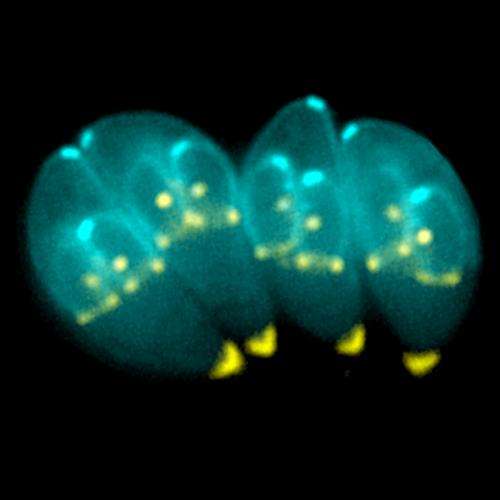July 25, 2018 report
Toxoplasma gondii parasite linked to risky business behavior

An international team of researchers has found a possible link between a parasitic infection and risky business behavior. In their paper published in Proceedings of the Royal Society B, the group outlines an experiment they carried out to test possible behavioral changes due to Toxoplasma gondii parasitic infections and what they found.
The parasite Toxoplasma gondii is single-celled and as a group are believed to have infected over a quarter of the world's population. Fortunately, most people exhibit very few, if any, symptoms—those few who do, tend to report headache or flu-like symptoms. People generally become infected with the parasite by ingesting raw or undercooked meat or by handling cat feces (cleaning litter boxes). In this new effort, the researchers noted that rodents infected with the parasite tend to experience behavioral changes, such as engaging with cats, rather than running from them. They wondered if it was possible that people infected with the parasite might also experience behavioral changes.
To find out, they took saliva samples from 1,500 student volunteers. They also gathered 200 samples from people attending a seminar for prospective entrepreneurs. After testing the samples, the researchers found that 22 percent of those tested had been exposed to the parasite. They also found that of those students tested, those who were infected were 1.4 times more likely to be business majors. They also found that of those who attended the entrepreneurial seminar, those who had been infected were 1.8 times more likely than those who had not been infected to have already started their own business.
The researchers note that starting a business is considered to be very risky behavior—most fail at it and suffer economically as a result. As evidence of such infections causing risky behavior in people, they cite the fact that people who had been infected by the parasite were more likely to engage in such a risky pursuit.
The researchers plan to continue their research, looking for evidence of other behavioral changes such as increased conservatism in some people. They would also like to know if infections are more prevalent in people who launch successful entrepreneurial ventures as opposed to those who fail.
More information: Stefanie K. Johnson et al. Risky business: linkingToxoplasma gondiiinfection and entrepreneurship behaviours across individuals and countries, Proceedings of the Royal Society B: Biological Sciences (2018). DOI: 10.1098/rspb.2018.0822
Abstract
Disciplines such as business and economics often rely on the assumption of rationality when explaining complex human behaviours. However, growing evidence suggests that behaviour may concurrently be influenced by infectious microorganisms. The protozoan Toxoplasma gondii infects an estimated 2 billion people worldwide and has been linked to behavioural alterations in humans and other vertebrates. Here we integrate primary data from college students and business professionals with national-level information on cultural attitudes towards business to test the hypothesis that T. gondii infection influences individual- as well as societal-scale entrepreneurship activities. Using a saliva-based assay, we found that students (n = 1495) who tested IgG positive for T. gondii exposure were 1.4× more likely to major in business and 1.7× more likely to have an emphasis in 'management and entrepreneurship' over other business-related emphases. Among professionals attending entrepreneurship events, T. gondii-positive individuals were 1.8× more likely to have started their own business compared with other attendees (n = 197). Finally, after synthesizing and combining country-level databases on T. gondii infection from the past 25 years with the Global Entrepreneurship Monitor of entrepreneurial activity, we found that infection prevalence was a consistent, positive predictor of entrepreneurial activity and intentions at the national scale, regardless of whether previously identified economic covariates were included. Nations with higher infection also had a lower fraction of respondents citing 'fear of failure' in inhibiting new business ventures. While correlational, these results highlight the linkage between parasitic infection and complex human behaviours, including those relevant to business, entrepreneurship and economic productivity.
Journal information: Proceedings of the Royal Society B
© 2018 Phys.org















